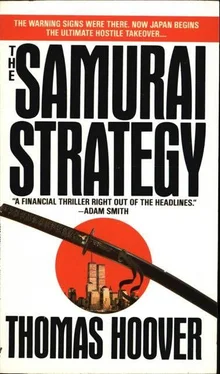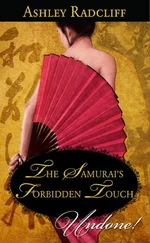Thomas Hoover - The samurai strategy
Здесь есть возможность читать онлайн «Thomas Hoover - The samurai strategy» весь текст электронной книги совершенно бесплатно (целиком полную версию без сокращений). В некоторых случаях можно слушать аудио, скачать через торрент в формате fb2 и присутствует краткое содержание. Жанр: Триллер, на английском языке. Описание произведения, (предисловие) а так же отзывы посетителей доступны на портале библиотеки ЛибКат.
- Название:The samurai strategy
- Автор:
- Жанр:
- Год:неизвестен
- ISBN:нет данных
- Рейтинг книги:5 / 5. Голосов: 1
-
Избранное:Добавить в избранное
- Отзывы:
-
Ваша оценка:
- 100
- 1
- 2
- 3
- 4
- 5
The samurai strategy: краткое содержание, описание и аннотация
Предлагаем к чтению аннотацию, описание, краткое содержание или предисловие (зависит от того, что написал сам автор книги «The samurai strategy»). Если вы не нашли необходимую информацию о книге — напишите в комментариях, мы постараемся отыскать её.
The samurai strategy — читать онлайн бесплатно полную книгу (весь текст) целиком
Ниже представлен текст книги, разбитый по страницам. Система сохранения места последней прочитанной страницы, позволяет с удобством читать онлайн бесплатно книгу «The samurai strategy», без необходимости каждый раз заново искать на чём Вы остановились. Поставьте закладку, и сможете в любой момент перейти на страницу, на которой закончили чтение.
Интервал:
Закладка:
And here she was. Already feeling recharged. Relaxed and…
Just then a short, excited hotel porter ducked his head in, bowed, and announced he'd just heard that the Emperor was about to be on TV.
His Majesty? The salon froze.
At first Tam thought the porter must just be playing some kind of local prank. Arcade high jinks.
Then she remembered the speculation in the papers. Could it be true? She glanced at her watch; it was a couple of minutes before twelve.
The girls immediately dropped everything and clicked on the big Toshiba digital set suspended over the mirror. Service halted in midstream, just as in a soba noodle shop when the sumo wrestlers on the corner tube had finished glaring, thrown salt three times, and were ready to lunge. Then one of the hairdressers remembered Tam and-maybe still believing no gaijin could understand her language-reached down to snap on the small black-and-white Sony attached to the chair arm, tuned to CNN's Tokyo service. It was currently scrolling temperatures in the U.S.
Now on the big Toshiba overhead, NHK (the government channel) was announcing they were about to switch to a remote broadcast, live, from the sacred Yasukuni Shrine.
Uh, oh, she thought. Yasukuni! Has everybody here gone crazy?
Back before 1945, Yasukuni had been a memorial to the "master race," official home of the new "State Shinto." Japan's militarists had revised traditional Shinto, a simple nature- reverence, to include violent nationalism, emperor worship, "the Yamato spirit," the "way of the samurai": every warlike aspect of national character. These days Yasukuni enshrined the names of Japan's two million heroic war dead, a roll call recently enlarged to include Tojo and others the U.S. later executed as criminals-which had turned the place into a political hot potato, resulting in an enormous flap when the prime minister tried to appear there in his official capacity. So, for the Emperor to show up suddenly, with heavy press coverage, was almost unthinkable. Besides, she'd just been by the place and hadn't noticed anything. This was very sudden.
Then the remote came on. The front of the shrine was roped off, right across the bronze torii gate, with only cameras and press allowed inside. On screen was a shot of an elaborate new dais where an official from the Imperial Household Agency, the government bureau that kept His Majesty under its care and schedules his appearances, was just finishing up a long-winded introduction. Then it was the prime minister's turn. After what seemed half an hour of absolutely content-less oratory (a Japanese politician's most respected skill) on the subject of the country's majestic Imperial past, the PM finally stepped aside to allow a tall, strikingly handsome Japanese man to approach the speaker's podium. Since the occasion had official significance, his walk was ceremonial, with his feet wide apart in the jerky samurai swagger necessitated in days of old by the two swords at the waist. Meanwhile, everybody around him was bowing low.
His Imperial Majesty, wearing a formal male kimono, equivalent to morning dress at Ascot, looked truly august. He was also carrying a long silver box, filigreed.
When he finally started to speak, the girls around Tam gasped in astonishment. She noticed immediately that he wasn't using modern Japanese. Instead, his language was an archaic, highly ornate dialect: the court speech of long ago.
After his brief, almost unintelligible prologue, one of the Household officials opened the box for him and took out a long, scrolled document. The cameras did a quick close-up, showing a page of antique, flowered paper inscribed with brush and sumi ink.
It turned out to be a letter in modern Japanese from the president of a financial organization called Dai Nippon, International. As the Emperor read it to the cameras, it began with a recounting of the loss of the Imperial sword in the Inland Sea during the 1185 battle of Dan-no-ura. That sword, it declared, signified Japan's physical link to a Divine past…
What? History 101 on TV?
Then came the bomb.
Abruptly CNN cut into their normal late-night programming for a live satellite report. Their reporter, grasping a mike and standing in front of the milling mob around the podium, was reading from a press handout that provided an English summary of the letter. Since the CNN signal was being flashed to the U.S. and then back to Japan on the "bird," effectively circling the globe, it was a few milliseconds behind the NHK broadcast. She turned up the sound.
… noon here in Tokyo, and at this shrine sacred to all Japanese, His Majesty, the Emperor of Japan (Cut to shot of the Emperor speaking. Reporter voice-over.) has startled the nation by announcing that marine archeologists working for an investment organization called Dai Nippon, International have just succeeded in recovering a famous symbol of early Imperial rule. A three-year secret project in the Inland Sea, funded by DNI, culminated five days ago when scientists brought up a watertight gold case containing what is believed to be the original Imperial sword. (Cut back to reporter.) Although no photos of the sword have as yet been released, we are told it is in virtually mint condition. (Glances down to read from press release.) According to the ancient Japanese chronicles, this sword was given to Japan's first emperor by the Sun Goddess Amaterasu-Omikami, sometime around the year 600 B.C., as a symbol of his divinity. Historians say it was later lost at sea in the 1185 Battle of Dan-no-ura. That bloody naval episode, the subject of much Japanese lore and tradition, marked the end of direct Imperial authority here and the rise of the first shoguns, military governors who would rule in his name…
She rolled down the sound. Who needed some English press summary? She was watching the whole incredible event live as it unfolded. And her first thought was: Good God, that's like finding Excalibur, or maybe the Ark of the Covenant. Myth turned into reality. She glanced around the salon, and already the electricity in the air was crackling. But what happened next turned out to be the real news, the hidden agenda.
After His Majesty finished reading the letter, he passed it to an underling and switched back to his ancient dialect. Now, though, his speech was being "translated" across the bottom of the screen into modern Japanese.
He declared that since the Imperial Household, through the loyal services of Dai Nippon, International, had had restored to it that which it always possessed, namely the sword, he was pleased to honor the firm by allowing it to construct a new museum to house the sacred symbol at a site just outside Ise, home of the official shrine of the Sun Goddess. On his authority, ground-breaking for the museum would begin immediately. However, until such time as it was constructed and consecrated, the Imperial Household would make the sacred relic available under heavy guard for viewing by the Japanese people in a temporary showplace located at the Meiji Shrine in Tokyo…
By now shops had begun closing and the corridor outside was in tumult. An excited young clerk from the flower stall next door burst through the door and, bowing to everybody, lavished bouquets on all the girls. From the streets above came a cacophony of sirens.
But it still wasn't over. The most crucial part of all, totally missed by the Western news force, was yet to come. After His Majesty was bowed away from the microphone, another official stepped forward to elaborate on the Emperor's remarks (probably because His Majesty would not deign to mention anything so crass as money). As reward for restoring the sword to His Majesty, he said, Dai Nippon would be allowed to serve as trustee of an official, honorary investment instrument, to be known as the Eight-Hundred-Year Fund. Acting for His Majesty, DNI would direct those monies into endeavors "commensurate with the nobility and ancient lineage of the Japanese people, as symbolized by the sword." Then a telephone number flashed across the bottom of the screen. The current subscription would be closed after eight hundred billion yen were pledged. The president of Dai Nippon had asked His Majesty for the honor of contributing the first billion yen personally. Finally, in a quick aside, he added that interest paid by the fund would of course be tax-free, as was normally the case for savings accounts in Japan.
Читать дальшеИнтервал:
Закладка:
Похожие книги на «The samurai strategy»
Представляем Вашему вниманию похожие книги на «The samurai strategy» списком для выбора. Мы отобрали схожую по названию и смыслу литературу в надежде предоставить читателям больше вариантов отыскать новые, интересные, ещё непрочитанные произведения.
Обсуждение, отзывы о книге «The samurai strategy» и просто собственные мнения читателей. Оставьте ваши комментарии, напишите, что Вы думаете о произведении, его смысле или главных героях. Укажите что конкретно понравилось, а что нет, и почему Вы так считаете.












